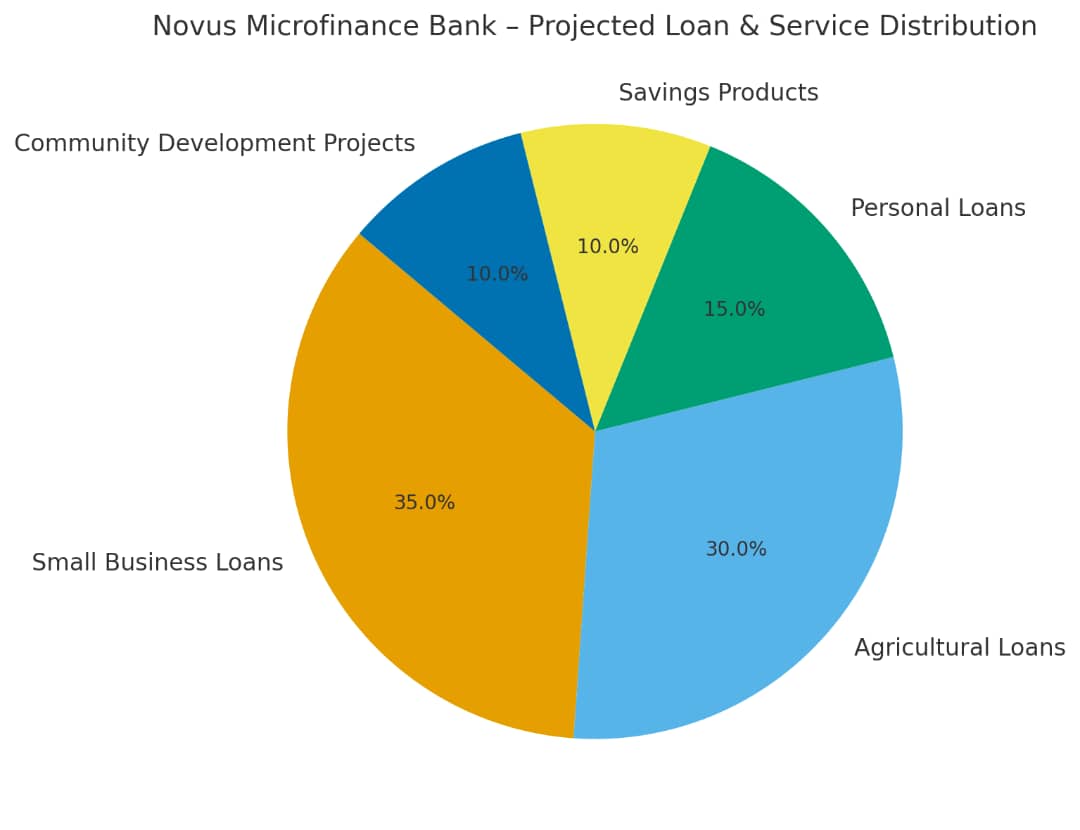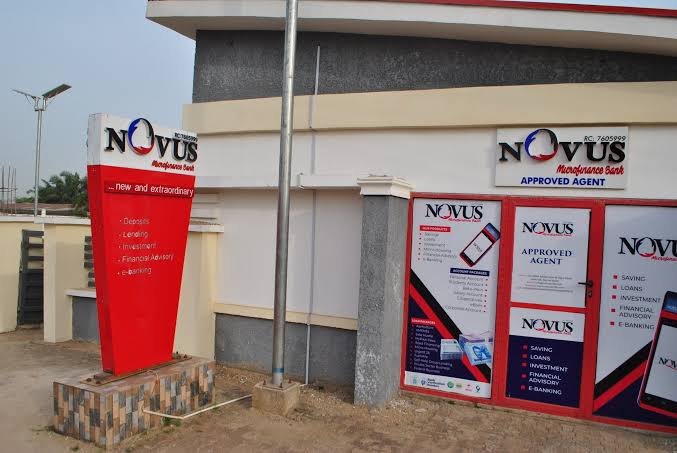Novus Microfinance Bank, unveiled by the Benue Investment and Property Company Limited (BIPC), has been established to expand financial inclusion and deliver sustainable, low-cost financial products across Benue State. Officially licensed by the Central Bank of Nigeria (CBN) on March 8, 2024, Novus aims to unlock financial freedom and create economic opportunities for individuals, micro, small and medium-sized enterprises (MSMEs), and agricultural actors.
Article highlights
- Novus Microfinance Bank received its CBN license on March 8, 2024 to operate in Benue State.
- “Novus” Latin for “New” symbolizes the bank’s commitment to innovative, customer-centric solutions.
- The bank focuses on agriculture, MSMEs, job creation, rural development, and financial literacy.
- Products include microloans, agricultural finance, savings accounts, group lending, and digital banking.
- Novus aims to align with the National Financial Inclusion Strategy and drive inclusive economic growth in Benue.
In a decisive move to strengthen financial access across Benue State, the Benue Investment and Property Company Limited (BIPC) has launched Novus Microfinance Bank. The bank’s formation signals an ambitious plan to address persistent financial exclusion by providing tailored, low-cost, high-impact financial services. The initiative targets individuals, micro and small businesses, farmers and rural communities groups that have historically struggled to access formal banking services.
Why Novus Matters: Filling a Critical Gap
Microfinance institutions have a long history in Nigeria of reaching underserved populations. Novus enters this crowded but essential market with a distinct mandate: create financial products that match the realities of Benue State residents. Benue, a region often referred to as the “Food Basket of the Nation” depends heavily on agriculture. Yet farmers, traders, and rural entrepreneurs regularly face barriers like limited collateral, seasonal cash flows, and poor infrastructure. Novus aims to address these gaps.
Licensed by the Central Bank of Nigeria
Receiving a license from the Central Bank of Nigeria (CBN) is a pivotal milestone for any financial institution. The CBN license, issued to Novus on March 8, 2024, confirms compliance with regulatory standards and governance expectations. This regulatory approval enhances public trust, provides operational legitimacy, and enables the bank to access wider payment and settlement systems vital for delivering digital banking and mobile services.
BIPC’s Vision and Strategic Goals
BIPC’s strategic vision for Novus centers on economic empowerment through measurable interventions:
- Financial inclusion: Extend bankable services to those outside the formal financial system.
- Agricultural support: Provide seasonally aligned credit and inputs financing to farmers.
- Entrepreneurship growth: Support MSMEs with working capital and capacity building.
- Job creation: Drive new employment opportunities through small business expansion.
- Rural development: Stimulate commerce and investment beyond urban centers.
- Financial literacy: Improve borrowers’ understanding of credit, savings, and digital finance.
“Novus”: The Name and Its Symbolic Weight
The choice of the Latin word Novus, meaning “new,” is intentional. It represents not only new products and services, but new approaches combining technology, community engagement, and sustainable finance models tailored to Benue’s socio-economic landscape. Novus positions itself as a transformative agent rather than merely another microfinance provider.
Target Beneficiaries
Novus’s product suite and outreach are designed for multiple beneficiary groups:
- Smallholder farmers: Seasonal loans, input financing, and crop value-chain support.
- Market traders & petty traders: Microloans to increase stock, improve stalls, and expand operations.
- Women entrepreneurs: Loans and saving schemes that address the unique financial barriers women face.
- Youth-led start-ups: Small ticket financing and advisory support for innovative ventures.
- Artisans and SMEs: Business development loans and group-based lending options.
Products and Services: What Novus Will Offer
Novus intends to roll out a range of products aligned with client needs and risk profiles. Key offerings include:
Microloans
Small-ticket loans designed for immediate working capital needs. Where appropriate, loans will be structured to reflect seasonal income cycles—for instance, disbursing to a farmer before planting season and aligning repayments with harvest receipts.
Agricultural Finance
Specialized products to finance inputs (seeds, fertilizers), mechanization (tractor hire or cooperative ownership), livestock purchases, and post-harvest processing. Novus will explore value-chain partnerships that reduce risk and increase productivity.
Savings Accounts
Flexible savings products promote financial discipline and create safety nets. Novus may offer tiered accounts, youth savings, and women-focused savings groups to encourage long-term financial planning.
Group Lending Models
Group lending which leverages social collateral and peer accountability remains effective in many communities. Novus will deploy group-based credit where individual collateral is limited.
Digital Banking & Mobile Services
Recognizing infrastructure constraints, Novus plans to use mobile-first solutions that work on feature phones and smartphones. Digital wallets, USSD banking codes, and agent networks will be central to extending reach in remote areas.
Capacity Building & Advisory
Financing without know-how can produce weak outcomes. Novus will pair loans with training on bookkeeping, business planning, crop management, and digital literacy to increase loan effectiveness.
How Novus Intends to Manage Risk
Microfinance in rural settings comes with specific risks irregular income flows, weather shocks, and market volatility. Novus plans several mitigation strategies:
- Client segmentation: Tailor loan sizes and tenure to client cash-flow realities.
- Insurance partnerships: Explore agricultural insurance products to protect borrowers from crop failure.
- Group guarantees: Use group lending and community endorsement for added security.
- Data-driven underwriting: Employ mobile data and transaction histories to build credit profiles.
- Graduated loan primer: Start smaller and increase loan access based on repayment behavior.
Potential Impact on Benue’s Economy
The arrival of Novus is likely to deliver multi-dimensional benefits:
- Increased agricultural productivity: Timely input finance and mechanization support can boost yields.
- Expanded commerce: Traders with working capital can grow inventories and increase market activity.
- Job creation: More thriving microenterprises translate to more employment, both direct and indirect.
- Women’s economic empowerment: Access to tailored loans and savings products helps women lead businesses and households to resilience.
- Rural upliftment: Heightened financial activity in rural towns can spur complementary services and infrastructure investments.
Alignment with National Financial Inclusion Goals
Novus’s mission aligns with Nigeria’s National Financial Inclusion Strategy (NFIS), which prioritizes extending financial services to underserved groups. By focusing on digital access, MSME finance, and agriculture, Novus supports national objectives to reduce poverty, increase cashless transactions, and ensure that economic growth benefits wider demographics.
Community Engagement and Trust-Building
Effective microfinance depends on trust. Novus plans to work closely with local leaders, cooperative societies, and civil society organizations to design products and deliver services in culturally appropriate ways. Financial literacy campaigns and community town halls will be important to build credibility and ensure uptake.
Operational Considerations and Infrastructure
To succeed operationally, Novus will need to address:
- Agent network development: Build agents across Benue to handle cash-in/cash-out transactions.
- Reliable digital platforms: Deploy robust mobile banking and back-office systems with offline capabilities.
- Staff training: Hire and train staff who understand local contexts and speak local languages.
- Partnerships: Collaborate with input suppliers, agritech firms, and off-takers to strengthen value chains.
Challenges and Mitigation Strategies
Novus will encounter barriers common to microfinance in emerging markets. Below are the key challenges and possible responses:
Loan Repayment & Credit Risk
Challenge: Default risk from seasonal borrowers and cash-flow variability.
Mitigation: Flexible repayment schedules, group lending, and linkage to savings to smooth cash flow.
Financial Literacy Gaps
Challenge: Misunderstanding of loan terms and poor bookkeeping.
Mitigation: Mandatory borrower training, simplified product disclosures, and digital nudges (SMS reminders).
Infrastructure Constraints
Challenge: Electricity and internet outages in remote communities.
Mitigation: Hybrid service models (USSD + agent networks) and offline-capable apps.
Competition & Market Differentiation
Challenge: Existing MFIs and banks already operate in parts of Benue.
Mitigation: Product tailoring, superior customer service, and partnerships with local value-chain actors to stand out.
Novus Microfinance Bank’s Projected Loan & Service Distribution
One of the unique features of Novus Microfinance Bank is its clear focus on channeling resources into areas that generate the greatest impact for individuals and communities. According to its projected service model, the bank will prioritize small business loans and agricultural financing, as these two sectors remain the backbone of Benue State’s economy and Nigeria at large. By dedicating the largest share of its resources to these areas, Novus aims to empower entrepreneurs, stimulate innovation, and support farmers in improving productivity and food security.
The projections show that approximately 35% of Novus’ services will go to small businesses, helping micro, small, and medium enterprises (MSMEs) overcome financing barriers. This is a critical intervention because most Nigerian MSMEs struggle with access to affordable credit, which hinders growth and job creation. With Novus’ support, small enterprises will be able to expand, hire more staff, and contribute meaningfully to local and regional economic development.
Similarly, 30% of the bank’s loan portfolio is expected to support agriculture, a sector that employs a significant percentage of the Benue populace. Farmers will benefit from tailored, low-interest agricultural loans that can be used for inputs such as seeds, fertilizers, machinery, and post-harvest storage. This focus aligns with Novus’ vision of strengthening rural livelihoods while enhancing food supply chains and boosting agro-based commerce.

Personal loans and savings products will collectively account for another 25% of Novus’ financial services. These offerings are designed to improve financial independence for individuals and families, enabling them to manage emergencies, invest in education, or build household assets. Accessible savings options will also encourage a culture of financial discipline while providing a safe place for people to grow their wealth.
Finally, 10% of Novus’ resources will be dedicated to community development projects, ensuring that the bank’s impact extends beyond individual clients to broader society. This allocation reflects Novus’ commitment to fostering inclusive growth, bridging rural-urban divides, and funding initiatives that enhance healthcare, education, and infrastructure within underserved communities.
By striking a balance between profitability and social impact, Novus Microfinance Bank’s projected loan and service distribution underscores its mission of driving inclusive financial growth, building resilience among low-income groups, and positioning Benue State as a model for sustainable rural economic transformation.
Expert and Stakeholder Perspectives
Financial analysts and community stakeholders have reacted positively to the Novus announcement. Analysts point to the appropriateness of focusing on agricultural finance and MSME support, noting that Benue’s economic recovery depends on unlocking credit for productive uses. Community leaders emphasize the social benefits greater women’s financial inclusion, youth employment, and the potential for localized value chain development.
“Novus represents a targeted approach to microfinance one that understands seasonality and the realities of rural enterprise. If well-implemented, it could transform livelihoods across Benue.” — Mr. Nelson Onyilo, an Independent financial analyst.
Measuring Success: KPIs and Impact Metrics
Novus should track a transparent set of performance indicators to measure both financial sustainability and social impact:
- Number of active borrowers (disaggregated by gender and location)
- Loan repayment rate (portfolio at risk metrics)
- Loan-to-deposit ratio (liquidity measure)
- Average loan size and tenor (product mix analysis)
- Number of MSMEs supported and jobs created
- Increase in crop yields or farm incomes for agricultural clients
- Customer satisfaction and retention
How Novus Loans Could Work in Practice
Smallholder Maize Farmer: A farmer receives a pre-planting input loan to purchase improved seed and fertilizer. The loan is disbursed in-line with the planting calendar and repaid post-harvest through a single repayment aligned with crop sales. The farmer also receives training on post-harvest handling and is linked to an off-taker that buys the harvest.
Market Trader: A female petty trader receives a working-capital loan to buy bulk stock at a discount. The trader’s loan is structured over a short tenure with weekly repayments to match market cash flows and is paired with basic bookkeeping training.
Youth Entrepreneur: A youth-owned agritech startup receives a small innovation loan and advisory support to pilot a mobile-based produce aggregation system. Novus helps the startup pilot the model in one local government area before potential scale-up.
Partnerships That Could Amplify Impact
To maximize reach and reduce risk, Novus may pursue partnerships with:
- Input suppliers: For input financing and in-kind loan disbursals.
- Off-takers / processors: To provide assured markets and reduce price risk for farmers.
- Insurance providers: To offer crop or livestock insurance and protect borrowers.
- NGOs and development agencies: For capacity building and co-financing projects.
Impact on Benue State’s Development
Novus Microfinance Bank is expected to significantly contribute to the economic growth of Benue State by:
- Boosting Agricultural Productivity: Affordable loans will enable farmers to purchase improved seedlings, fertilizers, and machinery.
- Enhancing Commerce: Traders will gain access to working capital, thereby increasing market activities.
- Empowering Women and Youth: Women-led businesses and youth startups will thrive through accessible financing.
- Reducing Unemployment: With better funding options, small businesses can expand and employ more workers.
- Encouraging Rural Growth: Development projects will spread beyond Makurdi to rural areas.
Challenges
While the vision of Novus is commendable, certain challenges may arise:
- Loan Defaults: Managing repayment risks in rural communities.
- Financial Literacy: Ensuring customers understand loan terms and savings culture.
- Infrastructure Gaps: Internet and electricity shortages in rural areas may hinder digital banking.
- Competition: Existing microfinance institutions already serve parts of Benue.
To succeed, Novus must combine innovative strategies with community engagement and effective risk management.
The launch of Novus Microfinance Bank by BIPC marks a milestone in Benue State’s economic development journey. By offering accessible, innovative, and sustainable financial solutions, Novus stands as a beacon of hope for underserved individuals and businesses.
With the support of the Central Bank of Nigeria, Novus is not just another financial institution it is a movement towards financial independence, entrepreneurship, and rural transformation.
By living up to its name, Novus “New” the bank promises to create fresh opportunities, empower communities, and unlock financial freedom for all.













It helps in terms of reaching people who don’t already have formal banking services, especially in rural or underserved areas.